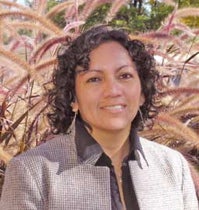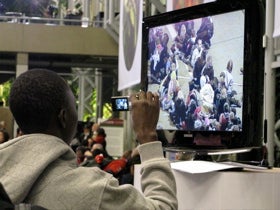From NCAR postdoctoral researcher to climate negotiator
Dec 13, 2009 - by Staff
Dec 13, 2009 - by Staff
Bob Henson | 14 December 2009 • A year ago, Mercy Borbor Córdova was navigating the hallways of NCAR, finishing a two-year appointment as one of two joint postdoctoral researchers with the InterAmerican Institute and NCAR's Advanced Study Program. This week, Borbor Córdova is literally on the world stage, serving as a delegate from Ecuador in Copenhagen.

"It was a last-minute thing," says of her appointment as one of Ecuador's 12 negotiators at the meeting. As an assessor working for Ecuador's national secretariat of risk management (Secretaria Nacional de Gestion de Riesgos), her career focuses on the role of capacity building: strengthening the abilities of under-resourced governments and people to manage their interests and improve public welfare.
"We are especially interested in themes of climate-research related and systematic observations, including early warning systems, risk management, and impact assessments on ecosystems, with special interest in glaciers, forest, and coastal zones," says Borbor Córdova.
Given Ecuador's relatively small size, its negotiators are teaming with others in several ways at Copenhagen. They are collaborating closely with Alianza Bolivariana para los Pueblos de Nuestra América, a group of nine nearby nations, as well as with the G77 group of developing nations.
"It's really important to work in consultation with other groups," says Borbor Córdova. "Negotiation is delicate and tough work. We hope the negotiations may accelerate enhancement of capacity building in vulnerable nations, based on the principle of shared and differentiated responsibilities and supported by the developed world."
Borbor Córdova came to NCAR in 2006 from a post as chief of the Department of Environmental Control in Guayaquil. Her postdoctoral research involved the impacts of industralization on air quality and children's health in two impoverished Guayaquil neighborhoods. "In my region, most of the people who are working on health and environment issues are facing big problems every single day," she notes. "It's not their job to think deeper about causes, develop hypotheses, and test them. To catch up with all we've done in the research area, we need to develop a group of scientists who will work with the policymakers and practitioners so that science reaches the community."
 Mercy Borbor Córdova (right) confers with NCAR's Rachel Hauser (left) and Lawrence Buja at the NCAR booth in Copenhagen.
Mercy Borbor Córdova (right) confers with NCAR's Rachel Hauser (left) and Lawrence Buja at the NCAR booth in Copenhagen.
When she returns from Copenhagen, Borbor Córdova will join colleagues in grappling with the impacts of a moderate El Niño now taking shape. Many parts of Ecuador can experience major flooding during an El Niño event, but the nation has also been dealing with serious drought in some of its Pacific provinces, she says. The country is now working to model the impacts of both drought and flooding on vulnerable peoples and livelihoods in various parts of Ecuador, part of a focus on hydrometeorological risk prevention and preparedness that includes infrastructure protection and water resources management for food security.
Miles to go: The goal posts remained far apart as the Copenhagen meeting passed its midpoint this weekend. While progress has been made on some issues, including how to foster and protect emissions-absorbing forests and transfer green technology to developing countries, the positions of wealthy and less-wealthy nations remain far apart. A group of 50 African nations is considering asking for steep emissions cuts in the developed world--50 percent by 2017 and 65 percent by 2020, both compared to 1990 levels--that far exceed what's been pledged to date. Another draft text now circulating specifies 25-45% cuts by 2020 compared to 1990 levels, which is still well above the current negotiation positions of the United States and other major players.
On Monday morning, the rift deepened. Negotiations were suspended after protests from a group of African countries over fears that the Kyoto Protocol was being sidelined in favor of a nonbinding agreement. "African countries pulled the emergency cord in Copenhagen today," stated a hastily issued news release from Oxfam International, one of hundreds of nongovernmental organizations on hand. At a midday press conference, UNFCCC executive secretary Yvo de Boer put the best possible face on the situation, noting that informal talks would proceed in the afternoon in an attempt to get the formal negotiations back on track. However, valuable time was lost, and the situation was deemed serious enough for the conference's own news service to acknowledge in a headline, "Climate talks in turbulence."
Update: Formal talks resumed on Monday afternoon after the impasse was cleared.

To the streets: The thousands of diplomats, activists, and journalists, huddling in the quiet, well-lit Bella Center were outnumbered by some 40,000 protestors who gathered in downtown Copenhagen on Saturday in a march sponsored by more than 500 organizations. After a round of speeches under the low-hanging midday sun, the group marched about six kilometers (roughly four miles) to the Bella Center, where they were joined by Desmond Tutu for a candlelight vigil.
Though the march was largely peaceful, nearly 1,000 participants were rounded up and arrested after a few bouts of rock-throwing broke out. By Sunday morning, almost all had been released, though hundreds more arrests occurred later that day in a separate demonstration and more protests were expected later in the week.
 Many conference participants watched the protest on Saturday, 12 December, through TV feeds scattered throughout the Bella Center.
Many conference participants watched the protest on Saturday, 12 December, through TV feeds scattered throughout the Bella Center.